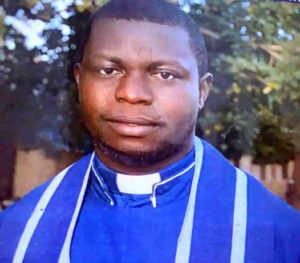
EDITORS’ NOTE: The following story replaces one with the same headline, utilizing additional information relayed to Baptist Press after its publication in June.
PORTLAND, Ore. (BP)–The discordance of visiting his missionary sister in the Eastern European chaos of the Czech Republic, then — the next week — sitting in a cell amid the emotional chaos of a county jail was too much for the 34-year-old heavy equipment operator.
Eric Johnson wept.
The false allegations of child sexual abuse that derailed Johnson’s life for about eight months are not uncommon among members of Southern Baptist churches, officials say. It’s a national problem fraught with controversy.
A 10-person police SWAT team’s early morning unannounced arrival at the basement apartment he rented had startled Johnson awake. He was arrested, read his rights, handcuffed, hauled off to a crowded inner-city jail and told he’d been charged with 45 counts of sexual abuse of the son of the woman he’d been divorced from for eight years.
The alleged sexual abuse was said to have taken place during a three-year period before the divorce. The young man, now 17, had finally worked up the courage to talk about it, his hysterical mother had told an investigating social worker.
That was all the basis police needed for their arrest.
After spending more than seven months in Multnomah County (Ore.) Jail because he couldn’t post the $1.5 million bond (set because of the number of charges against him), Johnson, reared in a Southern Baptist home in Phoenix, Ariz., was completely cleared of all charges in a jury trial this spring.
That brings Johnson into the forefront of two national controversies: First: How can authorities protect children’s and adults’ rights at the same time and with the same intensity? Second: How valid are reports that utilize “recovered memory” of traumatic incidents suppressed for years in the mind of a child?
Picture a boxing ring with an innocent child crying in one corner.
Picture the child’s mother angrily pointing to the hulking father in another corner, saying, “You big meanie!”
And the father responds defensively: “I never touched the kid!”
A natural response is to leap to the protection of the defenseless child and brave mother, and let the father take care of himself.
The problem is the immediate punishment that takes place before guilt is determined by a court of law: the loss of reputation that may never be regained, the loss of freedom, the loss of income, the loss of trust in the American judicial system.
Johnson’s acquittal fuels the controversy, said Phil Sheldon, founder of Survivors And Victims Empowered.
“Why are recovered memories from men who fought in war believable, but recovered memories from children aren’t?” Sheldon asked. “I’m sorry for Mr. Johnson’s suffering. But we must work to fix problems within the system, and protecting children still needs to be of paramount concern.
“We believe one in four girls and one in six boys are sexually molested before they reach age 18,” Sheldon pointed out, citing studies conducted by the Los Angeles Times in 1985 and the Gallup organization in 1995.
Sheldon’s Internet site — www.s-a-v-e.org — provides many helps for parents who want to protect their children from child sexual abuse and, for professionals and ministers, a bimonthly magazine, Treating Abuse Today.
What are the helps for parents who’ve been accused, often as part of an acrimonious divorce, of sexually molesting children in the home?
“There are very few safeguards in place to guard against false allegations,” said Darren Kessler, a child dependency and criminal law specialist in San Francisco, who has worked with the Pacific Justice Institute, which handles defense of religious freedom, parents’ rights and other basic constitutional civil liberties cases. “The law in California is changing even more this year to allow almost complete power to social workers and other clinicians who respond to the allegations.”
Armin A. Brott has written five books on fatherhood, including “The Single Father,” released in May by Abbeville Press. He has talked with many men who, like he, are non-custodial parents of children they love dearly. Some of the men have been charged with allegations of sexual abuse.
“It’s like fighting a ghost,” Brott said in a telephone interview. “There’s no ‘innocent until proven guilty.’ The assumption by most people is that there must be something to such serious charges.”
State-funded social workers (often called child protective services workers), who are the first people called in when child sexual abuse allegations are made, are trained to be child advocates who accept the word of their clients, Brott said. “They also don’t want to make a mistake that would enable a pedophile to be free to harm other children,” he noted.
“The ‘believe the children’ idea was popularized by Roland Summit in an influential article in the journal Child Abuse & Neglect in 1983,” Brott said. “He wrote that children never fabricate the kinds of explicit sexual manipulations they divulge in complaints or interrogations. But Dr. Lee Coleman, a child psychiatrist and frequent expert witness in child abuse cases, has written that such a belief never had any data to support it.”
A San Diego County, Calif., grand jury in a Families In Crisis report published in 1992 said the “investigative” work of the biased state social worker is often accepted unquestioningly by harried police officers who, like most of society, are horrified at the thought that a man would sexually abuse the children in his home.
“This specific problem has gotten so out of hand in this country, it has been given a name: the SAID Syndrome, Sexual Allegations in Divorce,” the report stated. “… [T]here is really only one word that describes the thinking of those who attempt to justify the conviction of the innocent: hysteria. Hysteria is nothing but a wild outbreak of feelings that greatly exaggerate what is real.
“Depend on the fact that hysteria exists among child protective agencies, investigators, prosecutors, the courts and a great deal of the overall population,” the report continued. “It is usually because of this hysteria that innocent people are found guilty of the sexual abuse of a child when in fact no such sexual abuse has ever taken place.”
Child advocates refer to national statistics to support their contention that child sexual abuse is a significant and growing problem that has lifetime ramifications.
According to a fact sheet compiled by the National Clearinghouse on Child Abuse and Neglect, in 1996 child protective services agencies investigated more than 2 million reports alleging maltreatment of more than 3 million children, an approximate 18 percent increase since 1990. About 12 percent of the victims were sexually abused.
The facts were compiled from the Third National Incidence Study of Child Abuse and Neglect in 1996. According to this study, the estimated number of reports of sexually abused children rose from 119,200 in 1986 (the date of the previous study) to 217,700 in 1996.
How many of the child sexual abuse reports were false?
One widely touted early 1990s study (cited as recently as March 15 in Time magazine) determined that up to 80 percent of divorce-related sexual-abuse allegations were false. However, that study’s authors and their scientific methods were discredited a year later.
Seth Goldstein, executive director of the Child Abuse Forensic Institute in California, is among many people who are much more conservative in their estimates.
“The statistical probability of a false report is much less than is commonly believed,” Goldstein wrote in a paper published in The APSAC Advisor in 1998. APSAC is an acronym for American Professional Society on the Abuse of Children. The number of false accusations is probably no more than 10 percent, he stated, citing several studies.
Merrilyn McDonald agreed with Goldstein. A Washington State family preservation therapist with a master’s degree in social work, she wrote a paper titled, “The Myth of Epidemic False Allegations of Sexual Abuse in Divorce Cases,” that appeared in the spring 1998 issue of Court Review. In one study of 9,000 divorced families with custody or visitation disputes, fewer than 2 percent had allegations of child sexual abuse, she wrote, citing a 1990 study by Nancy Thoennes and Patricia G. Tjaden.
Nonetheless, for those who are falsely accused, the price is high.
Heavy equipment operator Johnson lost his ability to earn a living and even his unemployment benefits because he was out of work — in jail — for more than seven months after he was falsely accused of child sexual abuse. He lost his apartment, reputation and sense of personal safety in the community, even in jail: A neighbor hung a noose on the back of Johnson’s pickup truck; a fellow inmate threatened him upon learning of the sexual-abuse charges.
One of Johnson’s most disconcerting losses was the comfortable and close contact with family and friends that had been part of his normal routine. Christmas in jail was especially hard, he said.
He — and his family — also lost money. The $60,000 attorney’s fee came from Johnson’s retirement fund ($17,000; all he had), his parents’ savings and the refinancing of their home. Family members spent about $15,000, primarily for dozens of collect telephone calls each month, and for air travel from the Czech Republic, Arizona, California, Missouri and Kansas to testify in the trial.
Johnson also lost trust in a justice system he’d previously thought would protect a person who lived honorably, and he almost lost heart, he said.
Even in the last few weeks before his trial, Johnson considered accepting a “sure bet” plea bargain — three and a half years in prison if he would admit guilt to one count of child sexual abuse — instead of the possibility that a jury could find him guilty of all counts and sentence him to 800 years in prison. Accepting a plea bargain would save the expense of a trial, and it would spare his family the anguish of testifying and bring everything to a quick conclusion, a weary Johnson contemplated during some sleepless early-morning hours.
But because of his faith, Johnson never lost hope.
“As I was laying on my bed the week before the trial, the Lord gave me a symbolic message,” Johnson said. “It was very vivid. Remember when the children of Israel on the banks of the Red Sea were complaining to Moses about coming so far, but the Egyptians were so close, coming after them? The trial to me was the Red Sea; the Egyptians, the lies; and I was like the children of Israel. God caused the Red Sea to part, the children of Israel crossed to the other side and the Egyptians were killed.
“Then, on the last day, as I was going to hear the jury’s verdict, I picked up [the devotional booklet] Our Daily Bread,” Johnson said. “The Scripture that day was from this very passage and with it, the Lord tied everything together. It [the booklet] said, ‘God will make a way.’ Even now, remembering that is really encouraging to me.”
During his time in jail, Johnson started a Bible study of the New Testament Book of Acts for about a dozen inmates, which was led by a jail chaplain. He was interested in Acts because in it, the Apostle Paul was shipwrecked, and he meanwhile was feeling as though his life had been shipwrecked.
The Bible study in the county jail is continuing and lives are being visibly changed, Johnson added.
“What the Lord did for me he could do for everybody, but it took a lot of prayer and a lot of support from people,” said Johnson, a member at Milwaukie (Ore.) Baptist Church. “The Lord moved in an awesome way in my life. I feel for the people in prison who are innocent but who have been found guilty.”
Barrett Duke, spokesman for the Southern Baptist Convention Ethics & Religious Liberty Commission, recommends Christians treat rumors as gossip.
“Because sexual abuse of a child is such a repulsive act, it is understandable that people would be suspicious about anyone accused of this terrible activity,” Duke said. “However, it is tragic that a person’s life could be destroyed by a false allegation of sexual abuse of a child. While we must treat sexual abuse with all of the gravity it deserves, we must also be certain not to judge an individual on unsubstantiated rumors. We must find out the truth before we condemn anyone.”
This story can be used in tandem with a first-person story in (BP), “Eric had been free all along, waiting trial in his jail cell,” dated 6/29/99.













